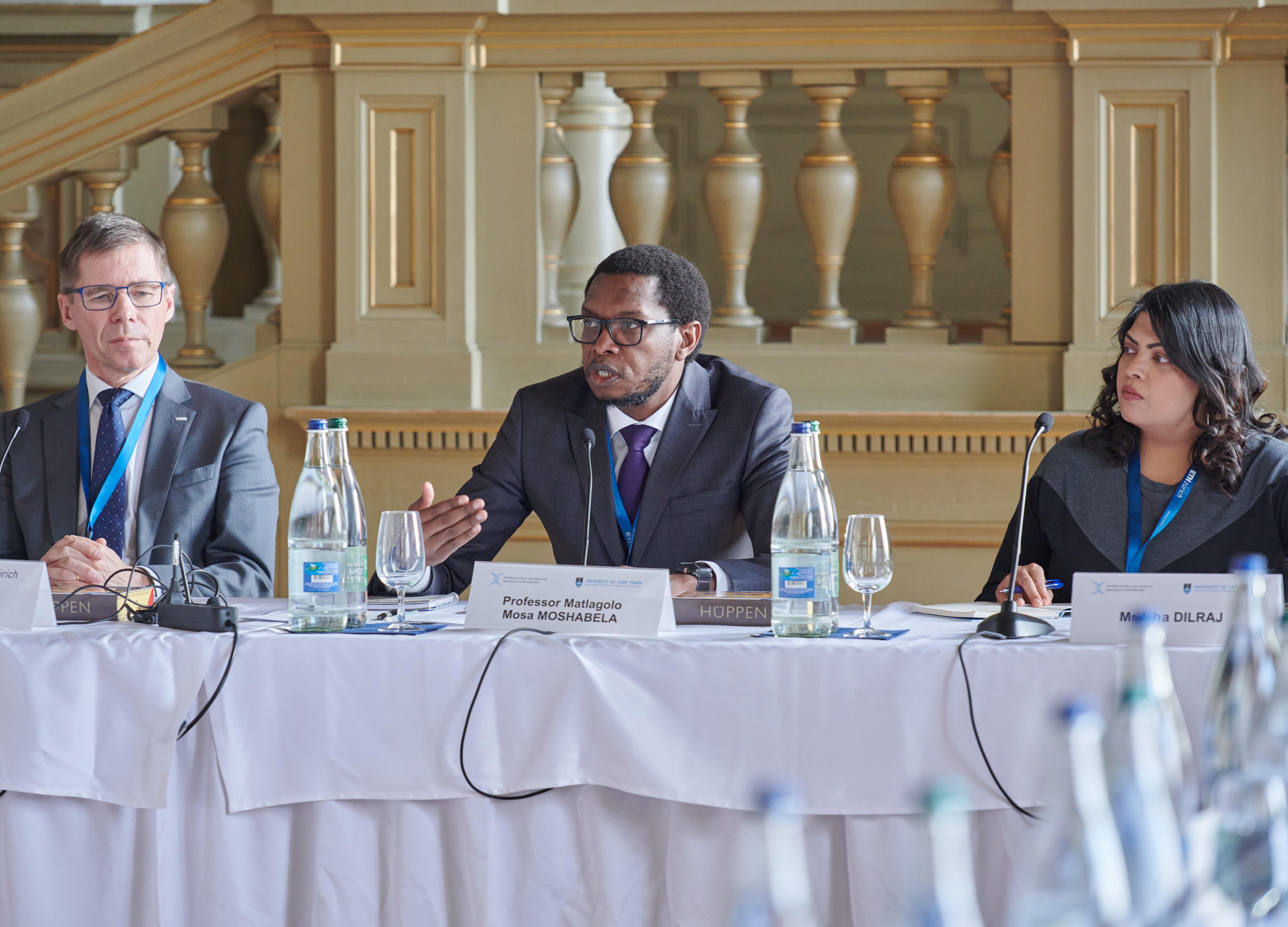Foregrounding Africa: UCT and VC leads on international stage
27 February 2025 | Story Isha Dilraj. Photos Supplied. Voice Cwenga Koyana. Read time 6 min.
The University of Cape Town (UCT) and Vice-Chancellor (VC) Professor Mosa Moshabela, respectively as the Secretariat and Chair of the International Alliance of Research Universities (IARU), led the President's Meeting at ETH Zurich, Switzerland, in January 2025.
Amidst the current global challenges, universities hold the unique position as the balancing force between innovation and ethical stewardship, while profoundly reshaping how knowledge is created, shared and applied.
As the leading university in Africa, UCT has the opportunity and responsibility to shape international conversations for public good, ensuring inclusivity, equity and accountability. Principles that Professor Moshabela champions while centring the African voice on the global stage.
He noted that: "Our commitment to global engagement is rooted in the belief that African perspectives must not only be included but must lead in shaping the future of higher education and research. By fostering inclusive and equitable collaborations, we ensure that knowledge production reflects the richness and diversity of our continent."
IARU Chair and Secretariat
The alliance is a strategic partnership and collaboration between 11 of the world's leading research-intensive universities. The members are the Australian National University, ETH Zurich, National University of Singapore, Peking University, University of California, Berkeley, University of Cambridge, University of Cape Town, University of Copenhagen, University of Oxford, the University of Tokyo and Yale University. UCT was elected to lead the alliance as the Chair and Secretariat in 2023 and holds this pivotal position until September 2026.
IARU’s vision includes addressing the major challenges of our time in providing sustainable solutions for growth and development. As an alliance, their focus is to add value by providing opportunities like Early Career Collaboration Awards, Global Internships, courses and exchanges to students and staff that would not arise otherwise. This is accomplished via worldwide education initiatives aimed at cultivating a sense of global citizenship and leadership amongst students. These projects are also geared at offering support for joint institutional work of various levels of the member universities such as inter-university networking, institutional learning as well as staff development and research collaboration.
The VC commented: "UCT’s role as both a member and the secretariat of IARU positions us at the heart of a global network dedicated to impactful collaboration. This engagement amplifies our ability to drive sustainable solutions, expand opportunities for our students and staff, and shape international conversations on higher education and research. Through joint initiatives, we not only contribute African perspectives to global challenges but also enhance institutional learning, research partnerships, and leadership development across borders."

Presidents Meeting: Leading international conversations
The IARU Presidents Meeting held at ETH Zurich was an impactful and dynamic international event that VC Moshabela, as Chair of the Alliance, led. The meeting brought the 11 universities’ vice-chancellors, rectors and senior officer leaders around the table to deliberate and discuss the key challenges, opportunities and strategic areas of growth currently facing the higher education space. Especially given the turbulent global political economy, which simultaneously offers stimulating and exciting opportunities for innovation and collaboration.
In line with UCT’s Vision 2030 that commits the university to ‘unleashing knowledge in and from Africa to redefine and co-create a sustainable global future’, the engagements at the meeting also ensured not only foregrounding UCT, but also prioritising the African continent such that the existing divides do not further marginalise Africans.
“Engagements at the meeting ensured not only foregrounding UCT but also prioritising the African continent.”

Strategic focus: AI and the future of higher education
The world is in a moment of profound change and the role of higher education is now, more than ever, under unprecedented scrutiny. The meeting centred around the themes of rethinking the university and the role of AI in research by engaging with questions that allowed the delegates to reimagine the university and higher education sector.
Bold rethinking was encouraged, to not only anticipate and meet the demands of the 21st century, but to remain relevant as it unfolds. How higher education can be reimagined to align with the burgeoning global challenges and opportunities was a key question deliberated on. Including:
- What forces drive the transformation of higher education?
- How do universities adapt their teaching and learning, research and social responsiveness to remain relevant and impactful?
- How can universities expand upon their critical role in driving social progress, economic growth and environmental sustainability?

In navigating these conversations there was consensus that AI is rapidly becoming a key driver of change. Leading the session on AI and its role in research, the VC emphasised that: “Our continent faces the dual challenge of being underrepresented in global AI advancements and disproportionately impacted by digital divides. Our focus must be intentional. We need to lead AI research that speaks to the needs, aspirations, and realities of Africa. Leveraged properly, AI will become a gamechanger for our continent. As the leading university in Africa, our aim should be to not only lead for ourselves, but to chart a pathway to bridging the divide, for Africa to not be left behind.”
One of the impactful outcomes from the meeting included UCT being elected to lead an IARU working group on AI in charting a collaborative way forward.
 This work is licensed under a Creative Commons Attribution-NoDerivatives 4.0 International License.
This work is licensed under a Creative Commons Attribution-NoDerivatives 4.0 International License.
Please view the republishing articles page for more information.










